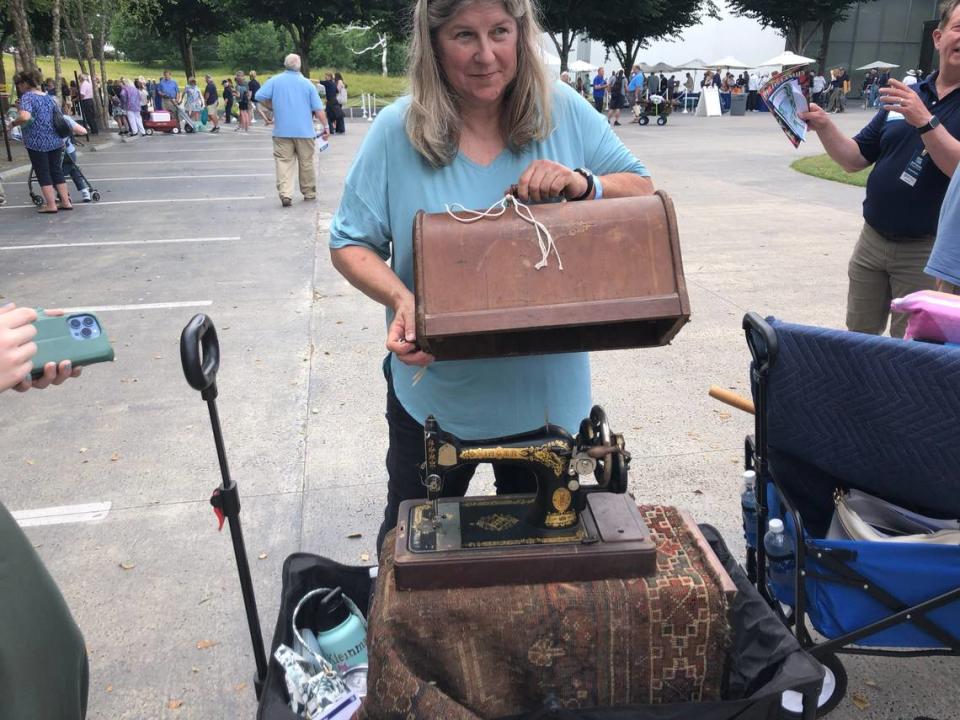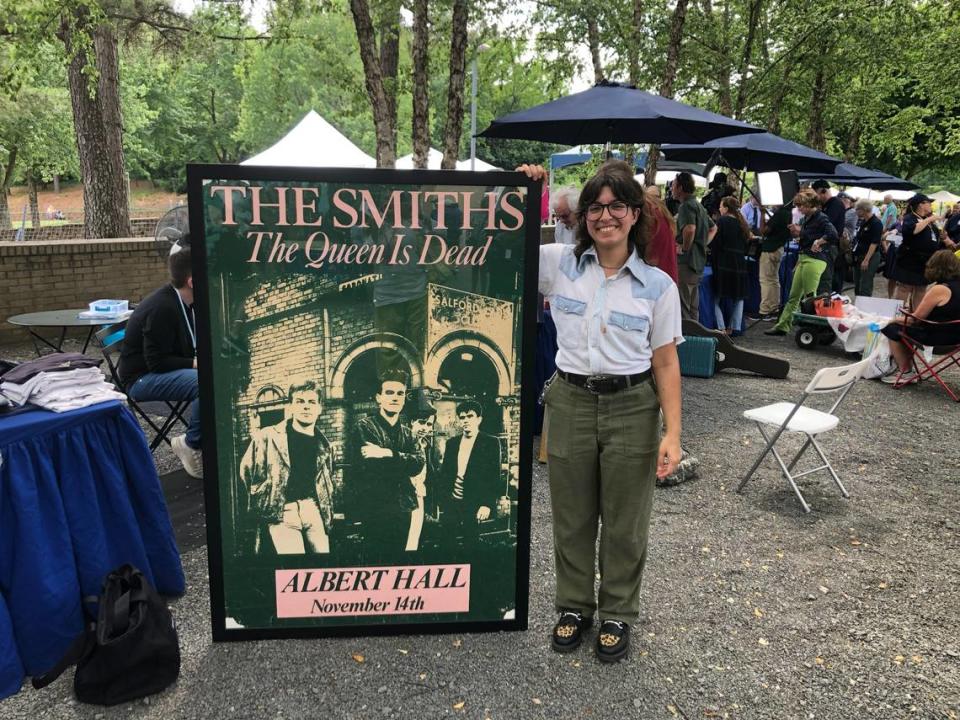‘Antiques Roadshow’ taped in Raleigh and we were there. Some of the treasures we saw
America’s favorite game of Show & Tell came to Raleigh Tuesday as the popular PBS program “Antiques Roadshow” turned the grounds of the N.C. Museum of Art into a traveling treasure trove.
Well, somebody treasured all that stuff — timeless clocks, brass sculptures, mahogany chairs, whimsical paintings, bulbous lamps — enough to buy it, keep it, dust it, pass it down or store it. Then they hauled it to the art museum to find out that the greatest value of any item may be in the story it tells.
“It’s been sitting in a box,” a lady named Macon from Winston-Salem said when appraiser Ken Gloss asked her where she had been keeping the yellowed contract from 1796 she had brought for him to consider. (“Roadshow” guests can only give their first names.)
Gloss, owner of The Brattle Book Shop in the show’s hometown of Boston, made small talk with Macon while a camera crew set up to film a segment in which he would tell her what her item was worth and why he found it interesting.
How ‘Antiques Roadshow’ works
Anyone who’s scrolled to the single-digit TV channels on a Monday between 8 and 9 p.m. knows the premise:
▪ Each season, “Roadshow” selects an itinerary of about five U.S. cities (there was one trip to Canada) and spends a day in each.
▪ Guests apply online for free tickets.
▪ About 3,000 people get to come to each location, and they’re allowed to bring two items, or closely related collections of items, which get evaluated by one of about 70 appraisers in 23 categories.
▪ Appraisers pay their own way to attend and give their time and opinions for free.
Of the 6,000 or so items that get evaluated at each city stop on the “Roadshow” tour, only about 150 will get filmed, and about 90 of those will make the cut to be included in any of the three shows made from each town.
Shows made from the visit to Raleigh will air in 2024.

Every item offers a chance to learn
Throughout the day, appraisers are constantly looking for items that will make good TV, and a high appraisal value is just one factor. It’s public television, so the show’s 6 million weekly viewers expect to be smarter at the end of the hour than at the beginning.
Every item that gets pulled out of a Trader Joe’s tote bag or a red Radio Flyer wagon is a story, a potential lesson in history, music, art, manufacturing, pop culture, or how to know the difference between real and fake.
Nicholas Lowry, president of Swann Auction Galleries in New York and a longtime “Roadshow” appraiser, showed a Goldsboro father and son, Bill and Matt, how to tell that a pair of Bull Durham Tobacco posters were reproductions from the late 1950s or early 1960s rather than original advertisements from the North Carolina company that began operations in the 1850s.
Bill said his wife had purchased the pair of posters, featuring racist images of Black people, at a thrift store, and he was curious to know their age and value. Lowry had Bill look at one of the posters through a magnifying loop, where he could see the dot matrix from the printing process, which hadn’t been invented in the 1800s.
The posters, still being printed and sold on the internet even now, were worth less than $20, Lowry told the men. Unfazed, they brought out some other, more notable artwork for one of Lowry’s colleagues to evaluate.
Do people sell their valuable items?
“Roadshow” Executive Producer Marsha Bemko said that while people love to hear their possessions are valuable, the appraisal usually just becomes part of the story that passes down through the generations with the item itself. She knows, she said, because she tried to launch a show about how much people sold their “Roadshow” treasures for.
“They’re not going to part with it,” she said. “Even if we tell them it’s worth a ton of money…99.9% of our people keep their stuff, no matter what we tell them.”
They may insure it, or find a better way to display it, or lock it up in a safe-deposit box, but they don’t go looking for an auction where they can capitalize on it, Bemko said.

A rarity discovered at Raleigh taping
Macon, the lady from Winston-Salem, might be on air next year.
The contract she brought that caught Gloss’s eye was drawn up by two men in her great aunt’s husband’s family.
“I don’t claim them,” she said immediately, because she had read the document in which these distant relatives had secured the services of two members of the Catawba Nation to travel with them to the British Isles.
The job they were to perform? To dress in Native American garb and put on a show.
Macon’s relatives promised in the contract to pay the two tribal members’ travel expenses in both directions, including room and board, and to pay them $100 each — about $2,300 today — when the group returned to the U.S.
After pitching Macon’s item to producers and getting the go-ahead to film a segment with her, Gloss did a bit of digging and learned that the “Indian show” was a big hit when the group landed in Edinburgh, but later, the two entrepreneurs ditched their Catawba cohorts, leaving them stranded and looking for way to get home.
With the cameras rolling, Gloss told Macon, “You just don’t see contracts like this,” and said it could bring about $3,000 at auction.
While she seemed impressed by the estimate, Macon told him her hope would be to put the document into the hands of historians for the Catawba Nation, which is based in Rock Hill, S.C., near Charlotte.


